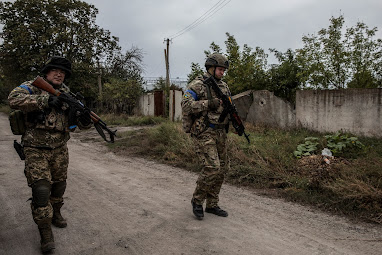I vividly recall the time when Ukraine was planning
and strategizing its counteroffensive, with the goal of pushing back Putin's
army and reclaiming their territory. During that period, virtually everyone I
knew was filled with jubilation, believing that Ukraine would finally impart a
lesson to Russia, given that Ukraine army is bolstered by the support they were
receiving from the United States and European Union nations. Regrettably,
Ukraine's counteroffensive ultimately ended in failure.
The facts are clear: Ukraine's
counter-offensive, a critical moment in the ongoing conflict with Russia,
ultimately failed to achieve its objectives. However, it is important to
clarify that the failure wasn't due to the incompetence of Ukrainian soldiers.
Instead, the operation's shortcomings can largely be attributed to the
extensive and prolonged advertising of the impending counter-offensive in the
months leading up to its execution. This over-advertisement had the unintended
consequence of tipping off the Russian military and, in essence, revealing
Ukraine's battle plans to its adversary. The result was a missed opportunity
that could have otherwise led to a successful campaign to reclaim lost
territories.
The counter-offensive garnered so much
attention and coverage that even children in Russia were well aware of it. This
widespread knowledge gave the Russian military ample time to strategize,
fortify their positions, and prepare to counter Ukraine's advances effectively.
Essentially, Ukraine's intentions were laid bare for their opponent, allowing
Russia to respond with both caution and precision.
In the realm of warfare, particularly when
confronting a calculated and cunning leader like Vladimir Putin and the
formidable Russian Army, disclosing your plans to the enemy is a fundamental
error. It is akin to handing them a playbook to anticipate your moves and
counter them. As the saying goes, "Loose lips sink ships." In this
case, Ukraine's efforts would have been better served if they had maintained
the utmost secrecy surrounding their counter-offensive plans. Had the operation
been conducted as a top-secret mission and executed swiftly and decisively, the
Ukrainian Army might have achieved a resounding victory over the Russian
forces. We could now be discussing the triumphant return of Crimea to Ukrainian
control instead of analyzing a campaign that fell short of expectations.
An invaluable lesson can be drawn from this
situation, as underscored by a saying passed down through generations: even the
most powerful and feared individuals in a village would not stand a chance
against a surprise attack. This principle extends to armies as well. Even a
well-equipped and formidable military force can be vulnerable to an unexpected
assault. To illustrate this point, consider the case of Israel on October 7,
when the Iran-backed terrorist group Hamas launched a sudden and vicious attack.
The element of surprise was their most potent weapon. If Hamas had openly
declared their intentions as Ukraine did with Russia, Israel would have been
better prepared to thwart their efforts, potentially intercepting them while
they were still in Gaza. In war, the element of surprise can often be the
decisive factor between success and failure.
This should serve as a valuable lesson for
both Ukraine and America: Never disclose your intentions to your enemy,
especially when that enemy is Putin. In my tribe (that is, the Igbo tribe of
Eastern Nigeria), there exists a profound proverb that encapsulates this
principle – "it is only a tree that will know you are coming to cut it
down and yet wait for you to do it." In stark contrast, when it comes to
human beings, if they are aware that you intend to harm them, they won't simply
stand idly by, awaiting your actions. Instead, they will take proactive
measures to evade capture or, even worse for you, they might set up an ambush
to confront you as you approach. This ancient wisdom holds significant
relevance in the realm of international affairs and warfare, and both Ukraine
and America should take heed.
Ukraine, in particular, should draw essential
insights from this proverb. As I noted earlier, the recent failure of their
counter-offensive, largely attributed to excessive pre-announcement and
publicity, highlights the critical importance of maintaining secrecy and
unpredictability in military strategy. Revealing your intentions to your
adversaries can be akin to handing them the upper hand, as it allows them to
prepare, adapt, and strategize accordingly. In a high-stakes geopolitical
landscape where deceit and surprise can be decisive factors, discretion is a
valuable asset. Similarly, America, despite its vast military capabilities and
resources, should not underestimate the wisdom embedded in this Igbo proverb.
In an era of global interconnectedness and information dissemination, the
temptation to broadcast intentions for various reasons, such as garnering
international support or demonstrating resolve, may arise. However, such
transparency must be weighed carefully against the potential risks it poses
when dealing with dictators such as Putin and Xi Jinping. Even a superpower
like the United States must remember that revealing intentions prematurely can
compromise the effectiveness of its military actions and diplomatic efforts.
Ultimately, the lesson is universal: In
strategic endeavors, whether they involve warfare, diplomacy, or any other form
of confrontation, the element of surprise and the ability to keep adversaries
in the dark can often be the key to success. As the world continues to evolve,
the significance of this ancient wisdom remains undiminished, reminding nations
and leaders that, in the face of adversaries, discretion can be a powerful
ally.





No comments:
Post a Comment